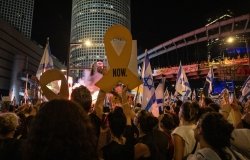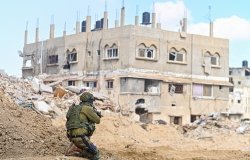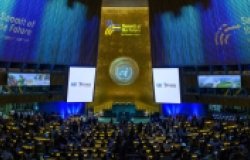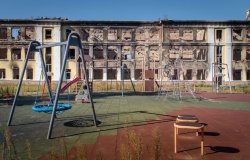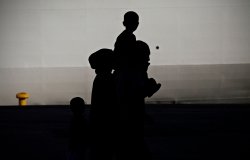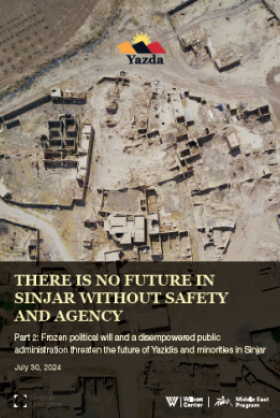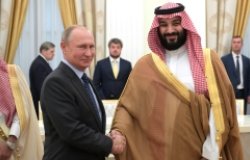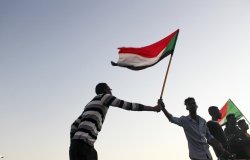Reversing Ethnic Cleansing in Bosnia: The Localized Geopolitics of Displacement and Return
Gerard Toal, Professor, Government and International Affairs, School of Public and International Affairs, Virginia Polytechnic and State University
Overview
Geopolitics is concerned with struggles over physical space: how that space is organized politically as well as how this struggle for power and control imprints upon it. It is from this perspective that Gerard Toal spoke about the war in Bosnia and the post-war policies that aim at returning the land (and its inhabitants) to what it once was.
Toal began by explaining that the war in Bosnia was actually a multiplicity of wars that were waged throughout the region. These battles were extremely localized, meaning that long-time neighbors fought against each other so that a given ethnicity could gain dominance within a city or village. The cities that were most bitterly contested were those in which the ethnic composition was nearly even, such as Zvornik Opstina, where about 48,000 residents were Muslim and 30,000 were Serbs. The rhetoric surrounding the Serb aggression towards the Muslim majority was typical of ethnocratic struggles for living space. In addition to moving people through forced migration and murder, the landscape was ethnically cleansed of muslim monuments. In Zvornik, five mosques were destroyed during the war and one Orthodox church was built, showing that monuments as well as people were displaced and replaced.
The Dayton Accords attempted to end the war, but also to right the wrongs it caused. In effect, it had the contradictory agenda of institutionalizing the political entities created by ethnic cleansing while also trying to reverse the ethnic cleansing that occurred. This contradiction reflected the inability of the local community and the international community to reconcile their opposing goals. For example, the so-called "inter-ethnic boundary line" (IEBL) was treated as a functional, but not permanent, border by the international community while the entities treated it as though it were state border, erecting signs and border crossings to reinforce the partition. Throughout the 1990s, the international community's goals reflected its fantasy of recreating a multicultural Bosnia while the local entities continued to work towards their ethnonationalist goals. As a result, international goals at the center were met with strong local obstructionism.
1996 represented a break from that pattern, when the international community acquired new capacity building capability at the local level. This was due in part to the new "Bonn Powers" which authorized the High Representative to remove elected Bosnian officials who were obstructing progress towards meeting the goals of the Dayton Accords, such as refugee returns. In 1999, this progress was further encouraged by the so called PLIP process, which voided local laws that had been adopted during the war and imposed a uniform legal process for the return of refugee property. This process led to a realization and acceptance of the fact that squatters could not continue inhabiting the homes of people who had left and that there was a clear procedure in place for refugees to reclaim their property. The international community was able to more easily monitor the implementation of this process, allowing for returns to take place, even though the numbers have been relatively small.
Does this mean that Bosnia-Herzegovina is getting closer to becoming a unitary state, where the IEBL is simply an administrative boundary rather than a hard border? Not exactly, Toal asserted, since there is still a strong divide evident by new construction that is being built along the IEBL to reinforce ethnic domination of the land. Thus, the separatist dream lives on in the Republika Srpska and the once-opposed Dayton Accords are now being used by the Serbs to reinforce this division.
There is good news, however, in the fact that the parties currently in power and pursuing separatism are losing ground within their constituencies. Among Bosnian Serbs, 68.3 percent believe that the situation is getting worse, showing that the economic and social costs of the war and its aftermath are too high a price for their ethnonational goals. It will be interesting to see if the nationalist parties can be defeated in the 2006 elections, enabling the multicultural fantasy of a unified Bosnian state to become more attainable.
Hosted By

Global Europe Program
The Global Europe Program is focused on Europe’s capabilities, and how it engages on critical global issues. We investigate European approaches to critical global issues. We examine Europe’s relations with Russia and Eurasia, China and the Indo-Pacific, the Middle East and Africa. Our initiatives include “Ukraine in Europe” – an examination of what it will take to make Ukraine’s European future a reality. But we also examine the role of NATO, the European Union and the OSCE, Europe’s energy security, transatlantic trade disputes, and challenges to democracy. The Global Europe Program’s staff, scholars-in-residence, and Global Fellows participate in seminars, policy study groups, and international conferences to provide analytical recommendations to policy makers and the media. Read more
Thank you for your interest in this event. Please send any feedback or questions to our Events staff.
